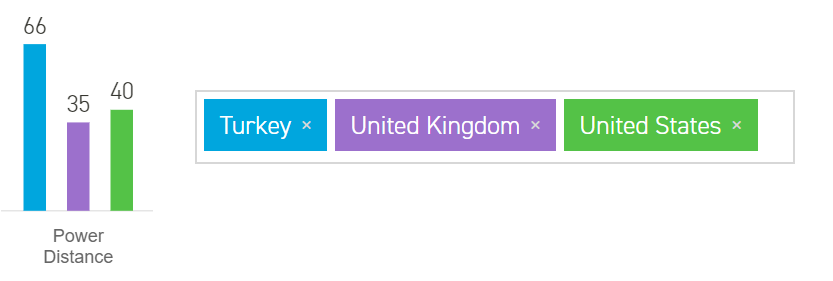Log in or register to save completed lessons.
Prerequisites for this Turkish Culture Lesson
Survival vocab and travel guide for your first visit to TurkeyBasic pronunciation
Survival words & phrases
Cultural guidelines
Turkey’s power distance score
According to Hofstede Insights, the country of Turkey scores 66 on the “power distance” cultural dimension. That’s 26 points higher on power distance in Turkey than the United States and 31 points higher than the United Kingdom:Source: Hofstede Insights
What is power distance?
Hofstede describes the power distance dimension as follows (emphasis original):-
This dimension deals with the fact that all individuals in societies are not equal – it expresses the attitude of the culture towards these inequalities amongst us. Power Distance is defined as the extent to which the less powerful members of institutions and organisations within a country expect and accept that power is distributed unequally.
(Hofstede Insights, “Country Comparison”)
Who has the power?
In Turkey there are a lot of cultural expectations surrounding relationships with people at different levels of power or authority. So, it is important to know who is considered powerful in Turkish culture. Once you know where you stand in relationship to others, you will be able to learn what is expected of you in that relationship. Here are some examples of people who hold power in Turkish relationships:| High power | Low power |
| Doctors | Patients |
| Teachers | Students |
| Experts and specialists | Customers |
| CEOs and supervisors | Employees |
| Husbands | Wives |
| Parents | Children |
| Older people | Younger people |
Cultural expectations about power distance
As with any cultural difference, it’s up to you to decide how much you want to conform to cultural expectations. On any given point, you may decide to deviate from cultural norms. But even in this case, you should know what is expected of you so that you can predict how others will react to you in a given situation. Remember to be slow in making value judgments on the morality of these cultural differences. Every culture has strengths and weaknesses, and everyone can learn from seeing the world from the perspective of a different culture. In the sections below are some of the cultural expectations in contexts where people in Turkey expect the power distance to be high.Power distance and following instructions
In Turkey, people with authority give instructions without needing to give reasons or justifications. They expect others to accept instructions without questioning. This does not mean that instructions are always followed – anyone who has ever been in rush hour traffic in Istanbul knows that traffic laws aren’t followed by everyone! However, instructions are usually politely accepted from those in power – whether or not the instructions will be followed later. The important thing in maintaining this relationship is that the expert was shown proper respect in the interaction itself.Example: doctors and patients
An example of this can be made by comparing doctor-patient interactions between the United States and Turkey. In the US, a doctor might briefly educate a patient about the benefits and drawbacks of a few treatment options. Then, they would expect the patient to make a decision based on this information. In Turkey, it would be much more common for a doctor to present what they believe is the best treatment option. Presenting other options would be unnecessary because the doctor has already considered the options and made a conclusion. The patient is expected to be appreciative of the doctor’s advice and give an affirmative response. If a patient doesn’t want to follow these instructions, they are free to go to another doctor or do something else. But if the patient pushes back or question the doctor’s instructions in front of them, the doctor may perceive this as disrespectful to his or her authority.Example: advice about your kid’s clothing
If you are raising kids in Turkey, you are likely to be given parenting advice even by people you do not know well. For example, someone might tell you to put more layers of clothing on your kids. Or they might tell you to not let them go barefoot on tile floors. In these situations, especially when the advice-giver is older than you, it is important to politely accept the advice. Again, you can do anything you want after they leave! But the culturally polite thing to do is to respond thankfully and respectfully to them when they give advice.Power distance and giving correction
In Turkish culture, people expect those in authoritative positions to have the necessary knowledge and skills to do their jobs. This means that when there are disagreements, the default expectation is that the person with authority will be “right” and the person under their authority will submit to this authority and not seek to correct them. It is generally not appropriate for the person in the lower position to correct the person in the higher position.Example: students and their teachers
In American culture, teachers might encourage students to point out any mistakes in their instruction. After all, nobody’s perfect, they argue. In Turkey, however, if a student were to make a correction to a teacher in front of other students, it would not normally be acceptable. The teacher may perceive it as an attempt to subvert their authority. For this reason, the teacher is likely to respond by trying to save face, even if the student was correct.Example: respecting the expert
Here’s another example. Let’s say you’ve hired a technician to do a specific job in Turkey, such as a plumber, carpenter or electrician. You might have strong opinions on how the job should be done. Since they are the expert, it is not polite to directly correct or contradict what they say. If you do, they may perceive it as disrespectful of their authority as experts on the matter. If you disagree with what the expert wants to do, you can address the issue with a question: “What if we do it like this…?” Or, you could start by saying something like, “I know I’m not the expert on this, but…”Getting things done: leave it to the experts!
In Turkish society, people usually prefer to rely on people who have had specialized training to do certain tasks. This is true even for tasks that they could likely figure out how to do themselves. This illustrates the understanding of power distance in Turkey. The experts – that is, those with power – should be trusted and respected.Example: homeschooling
Homeschooling is appealing to many Americans who distrust public schools and want more control over their child’s education. However, homeschooling is nearly unheard of in Turkey. The average mother would not feel qualified to teach their children even basic subjects because they have not studied to become a teacher. Even people in Turkey who are unhappy with the education system would rather entrust their children to trained professionals than teach their children themselves.Example: DIY projects
In Western cultures, many homeowners enjoy doing major do-it-yourself renovations themselves. Additionally, you will often find Westerners trying to search Google or Youtube for instructions to fix things that break, only calling a repair technician when they can’t figure it out. In Turkey, renovations and repairs are much more commonly done by trusted professionals such as painters, plumbers and carpenters who have specialized training in these jobs.Using formal language when power distance is high
One cultural expectation related to power distance in Turkey is to use polite and formal language when addressing people with higher authority. Most commonly, this respectful attitude is expressed by using the second person formal (“siz”) forms in sentences. The exception to this is among family members. Turkish people almost always use the informal second person “sen” forms when addressing family members with higher authority. But even in the less-formal family setting, using the correct familial terms is very important in showing proper respect. Besides the formal “siz” forms, here are some terms that you can use to address people in authority:| Authority | Title of respect |
| Doctors | “Doktor Murat Bey,” “Doktor Ayşe Hanım,” “Hocam” (teacher) |
| Teachers | “Hocam” (teacher), “Öğretmenim” (school teacher) |
| Experts and specialists | “Usta” |
| CEOs and supervisors | “Murat Bey,” “Ayşe Hanım,” “Müdür” (supervisor) |
| Older men | “Abi” (older brother), “Amca” (uncle), “Hoca” (teacher), “Beyefendi” (gentleman), “Efendim” (sir) |
| Older women | “Abla” (older sister), “Teyze” (aunt), “Hanımefendi” (lady), “Efendim” (ma’am) |
Additional resources
- Foreign to Familiar by Sarah A. Lanier
- Chapter 7 of this book covers power distance and other related concepts.
- Hofstede Insights, “Country Comparison”
- This tool compares different countries based on power distance and five other cultural dimensions.

